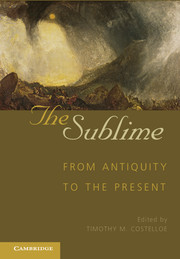Book contents
- Frontmatter
- Contents
- List of Illustrations
- Contributors
- Acknowledgments
- The Sublime
- Part One Philosophical History of the Sublime
- Part Two Disciplinary and other Perspectives
- 10 The First American Sublime
- 11 The Environmental Sublime
- 12 Religion and the Sublime
- 13 The British Romantic Sublime
- 14 The Sublime and the Fine Arts
- 15 Architecture and the Sublime
- Bibliography
- Index
- References
13 - The British Romantic Sublime
Published online by Cambridge University Press: 05 January 2015
- Frontmatter
- Contents
- List of Illustrations
- Contributors
- Acknowledgments
- The Sublime
- Part One Philosophical History of the Sublime
- Part Two Disciplinary and other Perspectives
- 10 The First American Sublime
- 11 The Environmental Sublime
- 12 Religion and the Sublime
- 13 The British Romantic Sublime
- 14 The Sublime and the Fine Arts
- 15 Architecture and the Sublime
- Bibliography
- Index
- References
Summary
RETHINKING THE ROMANTIC SUBLIME
How did the Romantics conceive of the sublime? This question, to which I will return, is less easily answered than a related one: how have critics conceived of the Romantic sublime? In the critical literature, “the Romantic sublime” refers to the mind’s transcendence of a natural and/or social world that finally cannot fulfill its desire. Revealed in the moment of the sublime is that the mind is not wholly of the world, but this revelation may be triggered by a particular setting in the world. The lonely grandeur of lakes and mountains, or the solemn interior of a cathedral, invite sublime musings. And these musings are typically conveyed in a heightened style that may itself be described as sublime or awe inspiring. Often cited as the epitome of the Romantic sublime is a passage from book 6 of William Wordsworth’s 1805 Prelude:
Our destiny, our nature, and our home, Is with infinitude – and only there; With hope it is, hope that can never die, Effort, and expectation, and desire, And something evermore about to be. The mind beneath such banners militant Thinks not of spoils or trophies, nor of aught That may attest its prowess, blest in thoughts That are their own perfection and reward – Strong in itself, and in the access of joy Which hides it like the overflowing Nile.
At this point in his narrative, Wordsworth has just crossed the Alps unwittingly, failing en route to achieve the grand prospect view he earlier imagined. He turns from his disappointment to praise the imagination as a power superior to any actual experience and to celebrate, in these lines, the soul as fundamentally alien to the world of the senses. Wordsworth expresses a yearning for the infinite, the unbounded, the supersensible; he expresses, as though it were a natural or intuitive aspect of our being, the desire to transcend the limitations imposed on us as finite, historically situated beings. Although this yearning evidently has religious roots (particularly neo-Platonic and Augustinian ones), its quasi-secular or at least nonsectarian expression comprises what we now think of as the Romantic sublime. Whether or not this yearning aptly or sufficiently characterizes what authors of the Romantic era actually took to be sublime is a question I shall address in this chapter.
Information
- Type
- Chapter
- Information
- The SublimeFrom Antiquity to the Present, pp. 203 - 216Publisher: Cambridge University PressPrint publication year: 2012
References
Accessibility standard: Unknown
Why this information is here
This section outlines the accessibility features of this content - including support for screen readers, full keyboard navigation and high-contrast display options. This may not be relevant for you.Accessibility Information
- 4
- Cited by
